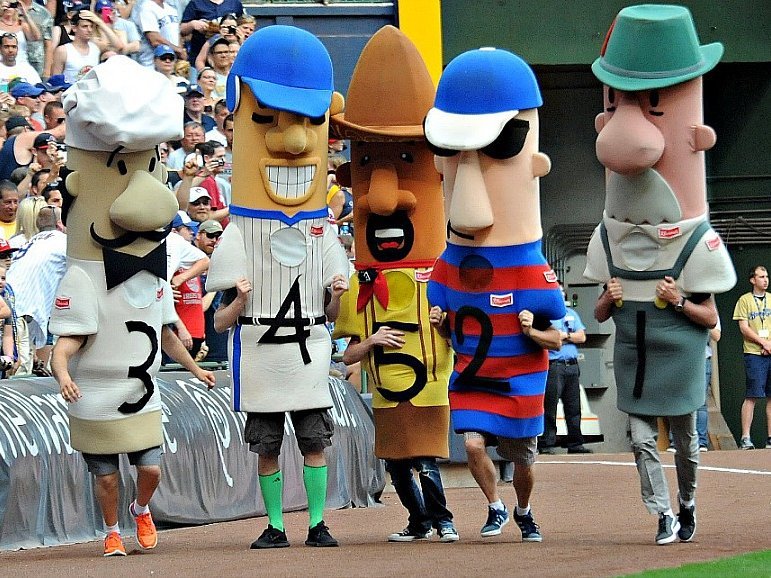{image1}Buy low, sell high. That's a winning philosophy in more than one walk of life, but it's a particularly adept credo when it comes to Major League Baseball closers.
Brewers general manager Doug Melvin devoutly follows this idea, and not just when it comes to closers. Since arriving in Milwaukee, Melvin has proven expert at finding little-regarded players, turning them into winning parts, and then dealing them for upgrades when the opportunity presents itself.
Witness Dan Kolb. An MLB vagabond who crossed paths with Melvin in Texas, Kolb grabbed hold of the closer job in late 2003, notching 21 saves in the second half of the season. He followed that with a franchise record 39 saves last year, earning an All-Star appearance along the way.
But there were some troubling trends, too. Kolb struggled to finish wins late in the year as the club swooned. And the former fireballer whiffed just 21 batters in 57+ innings of work, a stat that made a few people nervous. Sensing his value had peaked, Melvin peddled Kolb to Atlanta for starting prospect Jose Capellan this off-season.
One problem: Melvin didn't really have a late-inning successor in mind. Mike Adams figured to have a decent chance to replace Kolb, but Melvin added a couple other arms to make things interesting this spring, Ricky Bottalico and Derrick Turnbow.
It turns out the lack of an established closer wasn't a problem. The shaggy Turnbow has fared well, thus far, saving 6 games, winning 4 others, limiting hitters to a .145 batting average and compiling a 1.96 ERA in 17 outings. Will Turnbow be this good all year? Probably not, but he doesn't have to be: closers are probably the single most overrated commodity in baseball.
Sure they are, you're thinking -- until you don't have one. The Chicago Cubs, for one, seem to be lost without a closer this season. And I admit that there are instances where teams cannot seem to close out a game no matter who they use in the 9th inning.
But those cases are the exception. Today's closers are going to finish things out safely 80-85 percent of the time, regardless of who they are. Let's take a look at a few of the current save leaders. Francisco Cordero has 12 saves in 14 chances, Brandon Lyon is 13-for-14, Trevor Hoffman is 11-for-13, ex-Crew member Bob Wickman is 11-for-13, Danny Graves is 9-for-11 and Yhency Brazoban is 11-of-12. In fact, no closer with 9 or more saves (there are 15 of them) has more than 2 blown saves, and only one has none (Jose Mesa, 13-for-13).
Mr. Brazoban is a good case in point. The Dodgers are using Brazoban while stud closer Eric Gagne is on the disabled list. Gagne set an MLB record by converting 84 consecutive save chances before his streak was broken last year. He is the poster boy for dominant closers, and much was made of his injury's likely effect on the Dodgers' early chances this season.
But with Gagne disabled, the little-known and hard-to-pronounce Brazoban has gone 11-for-12 in save opportunities, and the Dodgers are just 1 game out of first place in the NL West.
Is Gagne a better closer than Brazoban? Sure, he is. But Gagne is due to make $8 million this year; Brazoban will pull in $319,500.
Ditto Turnbow and Kolb. While the Brewers unloaded Kolb and picked up a viable starting pitching prospect, the Braves will pay Kolb (10-for-12 on save chances with a 5.51 ERA) $3.4 million this season. Turnbow is 6-for-7, 1.95 and will earn $322,000.
In other words, saves are more overpriced than Prada handbags.
Play-by-play announcers and color commentators blather endlessly about the mentality needed to close games. You need to have a "short memory" and be able to get the "three toughest outs" in baseball, they say. There is some legitimacy to these ideas. And some pitchers aren't up to it.
But, apparently, many are. Danny Graves? He's got a 3.89 career ERA and once went 4-15 as a starter. Yet he was an All-Star closer (41 saves) last year despite blowing 9 chances.
How about White Sox closer Shingo Takatsu? He should wear a proverbial asbestos suit for all the fires he starts, not puts out, when he closes games. Still, he's 8-for-9 despite a 6.10 ERA.
And Red Sox star Keith Foulke has had his ups and downs this year with a 7.11 ERA. But he's still 9-for-11 overall and considered one of the game's best closers.
Now, closing games isn't a snap, but it isn't what it used to be. Guys today enter games with no one on and no one out in the 9th, in most cases, oftentimes with a 2- or 3-run lead. It's no wonder save numbers and conversion percentages are lofty.
Back when Rollie Fingers was closing for the Brewers, save totals weren't as inflated. Fingers, in my opinion the team's best closer over any one-year period, saved 28 and 29 games in 1981 and 1982. Scanning box scores from only July and August of '82, Fingers had saves in which he pitched 3, 1.2, 2.1 and 2 innings, lengthy and rare outings today. Of the contemporary closers, only the Yankees Mariano Rivera seems to enter games in the 8th inning with men on base (and only occasionally). Most begin with a clean slate in the 9th. That's why the formerly vogue term "fireman" is no longer used; fireman put out fires, today's closers rack up stats for arbitration hearings.
None of this is meant to belittle what Turnbow or quality closers accomplish today; it's just to say that too much emphasis is placed on saves. Turnbow, who has a reputation for wildness, is throwing strikes and getting the job done. He's served up a couple of homers in unfortunate spots, but that goes with the territory. If he finishes with 25 or 30 saves and converts 85 percent of his chances, he'll have done his job extremely well.
Periodically, a team lands someone like Rivera, a true difference-maker at the end of the bullpen. Oakland's Dennis Eckersley dominated the 9th inning in similar fashion for Oakland in the late 1980s and early 1990s. When they came in, the game was basically over.
But both Mo and Eck had memorable blown saves on the game's biggest stage: Rivera lost a Game 7 lead in the 2001 World Series to Arizona, and Eckersley surrendered Kirk Gibson's famous Game 1 homer in the '88 Series against the Dodgers. In other words, they blew games just like Graves does.
Melvin has played it perfectly. He realizes closers are valuable -- but he also realizes they don't have to be expensive to be worthwhile. Hitters and starting pitchers, however, generally aren't cheap. When resources are limited, a vaunted closer should be the last place you spend your money.
Sports shots columnist Tim Gutowski was born in a hospital in West Allis and his sporting heart never really left. He grew up in a tiny town 30 miles west of the city named Genesee and was in attendance at County Stadium the day the Brewers clinched the 1981 second-half AL East crown. I bet you can't say that.
Though Tim moved away from Wisconsin (to Iowa and eventually the suburbs of Chicago) as a 10-year-old, he eventually found his way back to Milwaukee. He remembers fondly the pre-Web days of listenting to static-filled Brewers games on AM 620 and crying after repeated Bears' victories over the Packers.




.jpg)


